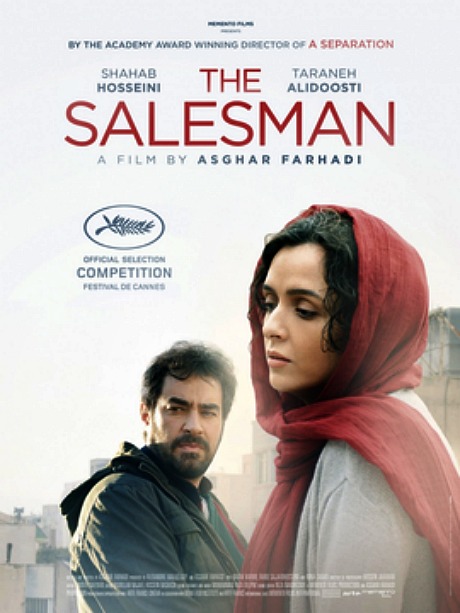Emad, a 30something Tehran school teacher (Shahab Hosseini), is playing Willy Loman in a stage production of Arthur Miller‘s Death of a Salesman, and his wife Rana (Taraneh Alidoosti) is playing Linda, Willy’s wife. An intriguing endeavor but the play, we soon learn, isn’t central to their story. Forced by structural problems to vacate their apartment building, the couple has moved into another place, a bit raggedy but reasonably spacious, that a friend has referred them to. The wrinkle is that it was recently vacated by a prostitute or, as locals describe her, “a woman with many male companions.” But things are otherwise okay. Emad and Rana are happy (they’re thinking about having a child), Emad enjoys his teaching job, the play is selling tickets, etc.

One day while Emad is out and Rana is about to take a shower, the front-door alarm sounds and Rana, presuming it’s Emad, pushes the buzzer. But it’s someone else — a client of the prostitute. We’re not shown what happens next, but Emad returns to signs of a struggle and blood stains on the floor. Rana has been taken to a hospital, he’s told. She’s okay but has suffered a head wound that requires stitches. She’s been assaulted but not raped.
The attack is bad enough, but from Eman’s perspective there’s another problem. Rana, traumatized and emotionally numb, is reluctant to share details about what precisely happened. At first she says she didn’t see her attacker’s face, but later she indicates that she did catch a glimpse. And then Emad finds someone’s cell phone and a set of keys in the apartment, and also a wad of cash. On top of which a pickup truck, apparently belonging to the attacker, is parked outside, and the keys Eman has found fit the door lock and the ignition.
Bit by bit, Eman becomes more and more anxious about Rana’s reluctance to tell the full tale, and he soon develops a notion that she might be harboring a secret of some kind. He doesn’t suspect her of infidelity but something about the attack doesn’t smell right, and he starts scowling and wondering what the fuck. He and Rana decide not to tell the police because there’s a slight stigma of shame that has rubbed off on Rana (Iran’s patriarchal notions about women make Donald Trump sound like Gloria Steinem), but Eman decides he’s going to find the culprit and give him what for.
And yet it’s all bottled up on both sides. Eman and Rana don’t really talk, but they bicker and give each other looks. And Eman continues to seethe. It all finally leads to a confrontation that doesn’t go well. I’m being deliberately vague.
What makes Asghar Farhadi‘s The Salesman so absorbing is that most of the reactions to the attack upon Rana — rage, shock, suspicion, confusion, bitterness, territoriality, a plan of revenge — happen within. Only Emad’s search for the attacker is acknowledged. Everything else is smothered. Especially in Eman’s case. His wife has been attacked but just as importantly (to him) his man-of-the-house pride has been wounded and he wants his vengeance. On one hand he’s obviously justified in wanting to punish his wife’s assailant, but this isn’t a Liam Neeson thing — it’s a matter of Iranian machismo.
The three Farhadi films that everyone has seen and admired (A Separation, About Elly, The Past) are part whodunits and part suspense stories. His method is to unpeel the evidence bit by bit, and with no great haste. He’s no slowboat, but he always reveals the particulars and especially the motives of his characters at a natural, gradual pace, knowing that viewers will hang in there and put it all together. But Farhadi takes it step by step, and is more into revealing than showing.

Yes, Farhadi’s stories are plotty and hinge on surprise revelations but the discipline is always paramount, the cinematography is always plain and at eye-level, the dialogue never hits any false notes and the performances are always strong and unmuddled. Hosseini and Alidoosti nail their parts like champs, and the other cast members augment with honors.
And yet somehow (this is the strange part) I wasn’t completely blown away by The Salesman. I was riveted all the way through but something about the third act (and I’m not going reveal any particulars) didn’t quite turn the lock.
I ended up feeling confused. Roughly a half-hour into last night’s screening I sensed that The Salesman would probably be at least a ground-rule double if not a triple. After an hour I was certain it was a triple. And then the big third-act climax happened, and I didn’t quite quite feel that Farhadi-level wham that I’ve come to expect from the guy (he’s a master) and I began to think it might be closer to a double. Then I changed my mind again and decided it was a triple after all — just not the kind of triple I was expecting. Then I began to get angry with myself for subjecting an Asghar Farhadi film to baseball metaphors in the first place.
I only know that The Salesman is not quite a homer (which A Separation definitely is/was). I have no idea what kind of impact The Salesman will have upon others. I can’t explain why I feel this without spoiling, and like I said I’m not going there.
There’s a parallel between the failings of a character who appears toward the end of The Salesman and Willy Loman, but that’s all I’m going to say. I’m also asking myself why the English-language title is The Salesman but the French title is The Client. The French title is the more apt.
I’m sorry to be picky but a Farhadi film is a special thing, and so you expect a bit more. The Salesman was easily one of the best of the Cannes Film Festival (right up there with Olivier Assayas‘ Personal Shopper and Cristian Mungiu‘s Graduation), but by Farhadi standards it doesn’t quite ring the big gong. But it got me going and I’m glad I saw it, and if it winds up winning something tomorrow night I’ll have no qualms.









